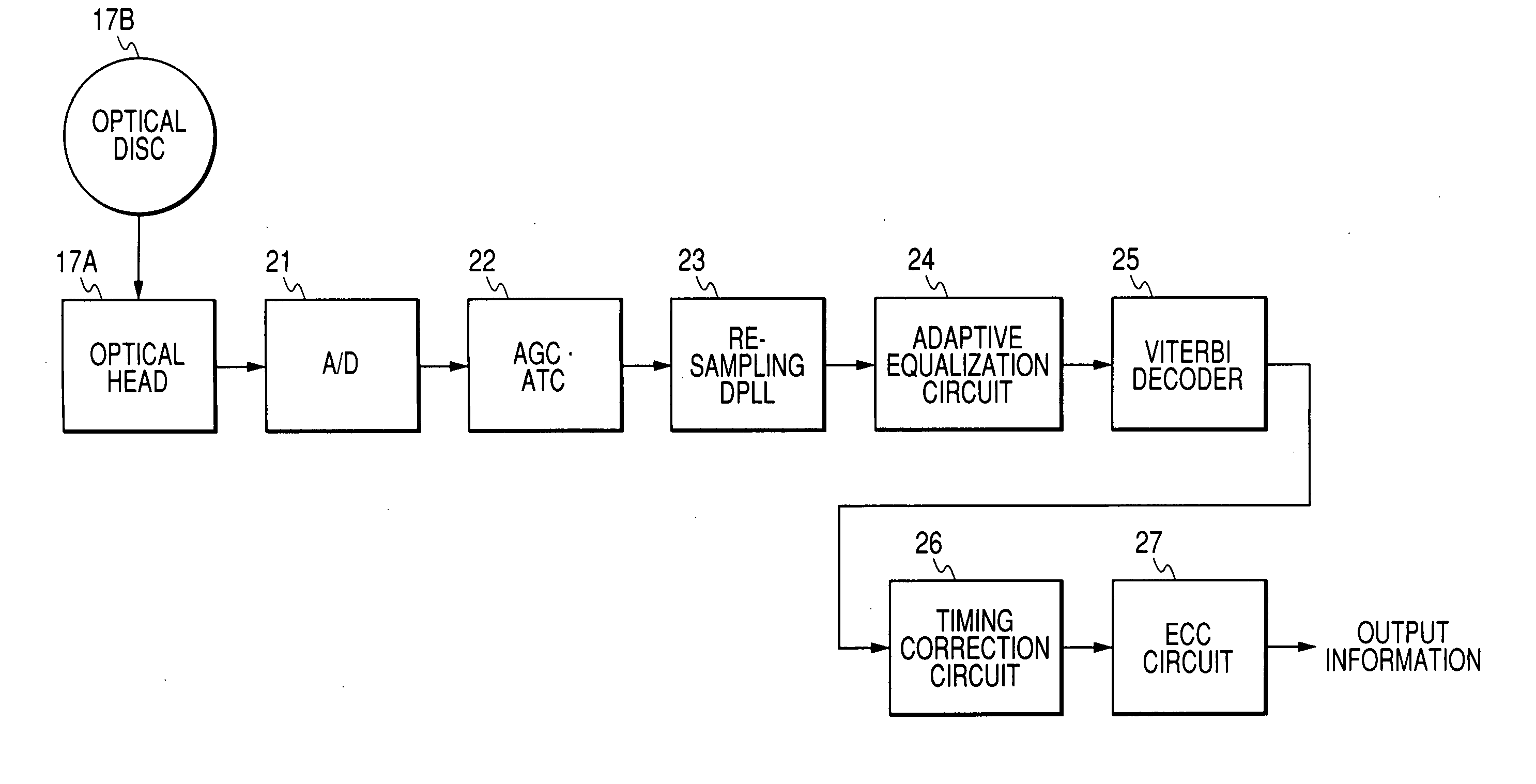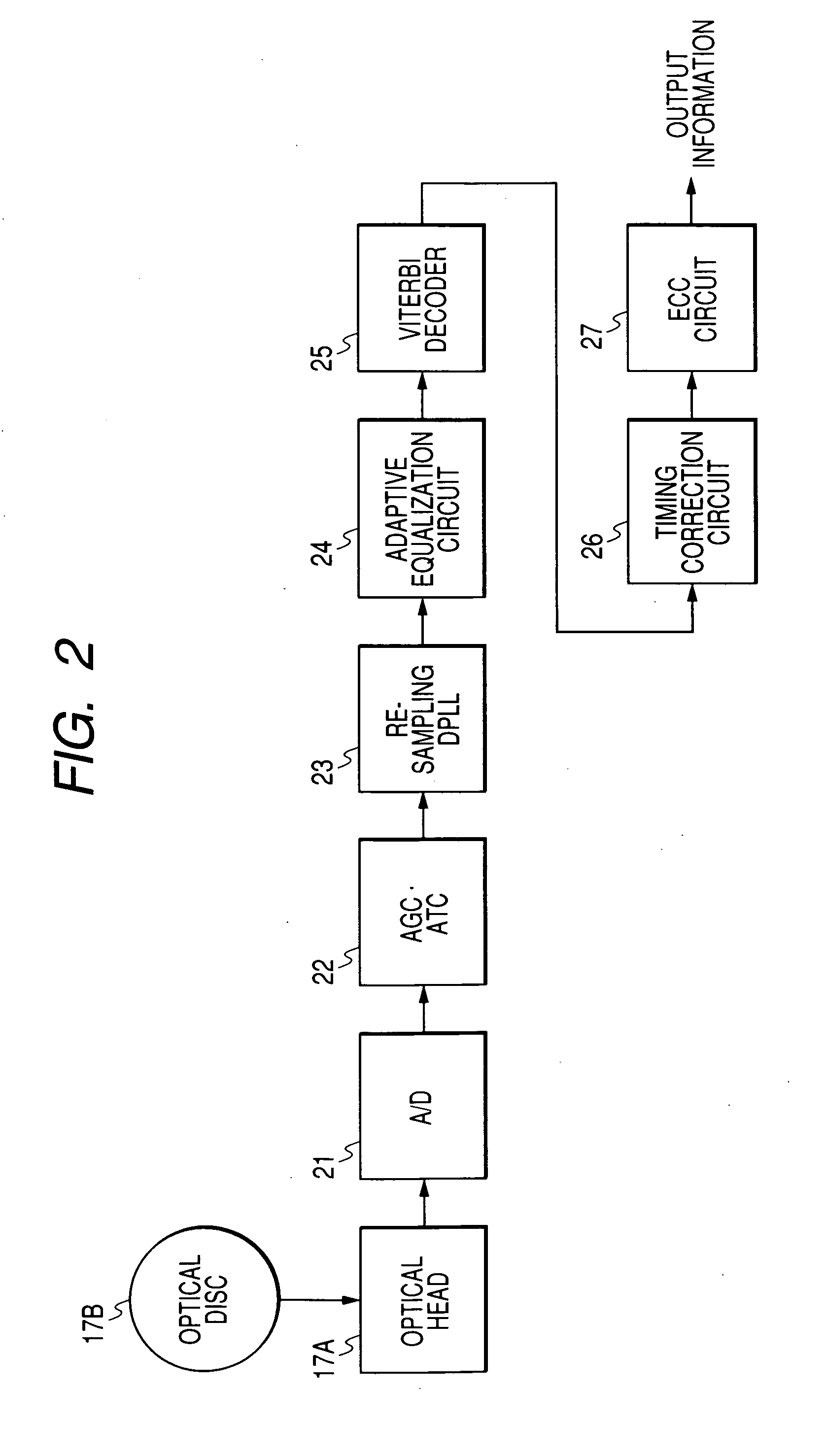Reproducing apparatus and method, and recording and reproducing apparatus
a technology which is applied in the field of reproducing apparatus and reproducing apparatus, can solve the problems of difficult pll circuit to accurately reproduce a bit clock signal from the read-out signal, loss of bits of digital information along a time base, and loss of bit slips, etc., and achieve the effect of restricting the error rate to a small valu
- Summary
- Abstract
- Description
- Claims
- Application Information
AI Technical Summary
Benefits of technology
Problems solved by technology
Method used
Image
Examples
first embodiment
[0051]FIG. 1 shows the recording side of a recording and reproducing apparatus in a first embodiment of this invention. As shown in FIG. 1, the recording side of the apparatus includes an ECC parity generation circuit 15, a run length encoding circuit 16, a strategy circuit 17, and an optical head 17A which are sequentially connected in that order. The optical head 17A can act on an optical disc 17B.
[0052] The ECC parity generation circuit 15 receives input digital information to be recorded. The ECC parity generation circuit 15 produces parity signals (ECC parity signals) in response to the input digital information. The parity signals include, for example, RS (Reed-Solomon) code signals and LDPC (low-density parity-check code) signals. The ECC parity generation circuit 15 adds the parity signals (the ECC parity signals) to the input digital information to get parity-added digital information. The ECC parity generation circuit 15 outputs the parity-added digital information to the...
second embodiment
[0095] The recording side of a recording and reproducing apparatus in a second embodiment of this invention is the same as that in the first embodiment of this invention.
[0096]FIG. 11 shows the reproducing side of the apparatus in the second embodiment of this invention. The reproducing side of the apparatus in FIG. 11 is similar to that in FIG. 2 except that a timing correction circuit 30 replaces the timing correction circuit 26 (see FIG. 2).
[0097] The timing correction circuit 30 receives the viterbi-decoded signal (the output signal of the viterbi decoder 25). The timing correction circuit 30 subjects the viterbi-decoded signal to run length decoding and timing correction. The timing correction circuit 30 outputs the resultant signal to the ECC circuit 27 as a second decoding-resultant signal.
[0098] The timing correction circuit 30 is designed to retrieve correct bit positions even in the case where a bit slip occurs so that on-signal bit positions are shifted from normal one...
third embodiment
[0133]FIG. 18 shows the recording side of a recording and reproducing apparatus in a third embodiment of this invention. The recording side in FIG. 18 is similar to that in FIG. 1 except that an ECC parity generation circuit 18 is interposed between the run length encoding circuit 16 and the strategy circuit 17.
[0134] The ECC parity generation circuit 18 receives the sequence of words of the run length limited code from the run length encoding circuit 16. The ECC parity generation circuit 18 produces parity signals (ECC parity signals) in response to the sequence of words of the run length limited code. The parity signals include, for example, RS code signals and LDPC signals. The ECC parity generation circuit 18 adds the parity signals (the ECC parity signals) to the sequence of words of the run length limited code to get a parity-added sequence of words of the run length limited code. The ECC parity generation circuit 18 outputs the parity-added sequence of words of the run lengt...
PUM
| Property | Measurement | Unit |
|---|---|---|
| run length | aaaaa | aaaaa |
| run-length | aaaaa | aaaaa |
| length | aaaaa | aaaaa |
Abstract
Description
Claims
Application Information
 Login to View More
Login to View More - R&D
- Intellectual Property
- Life Sciences
- Materials
- Tech Scout
- Unparalleled Data Quality
- Higher Quality Content
- 60% Fewer Hallucinations
Browse by: Latest US Patents, China's latest patents, Technical Efficacy Thesaurus, Application Domain, Technology Topic, Popular Technical Reports.
© 2025 PatSnap. All rights reserved.Legal|Privacy policy|Modern Slavery Act Transparency Statement|Sitemap|About US| Contact US: help@patsnap.com



